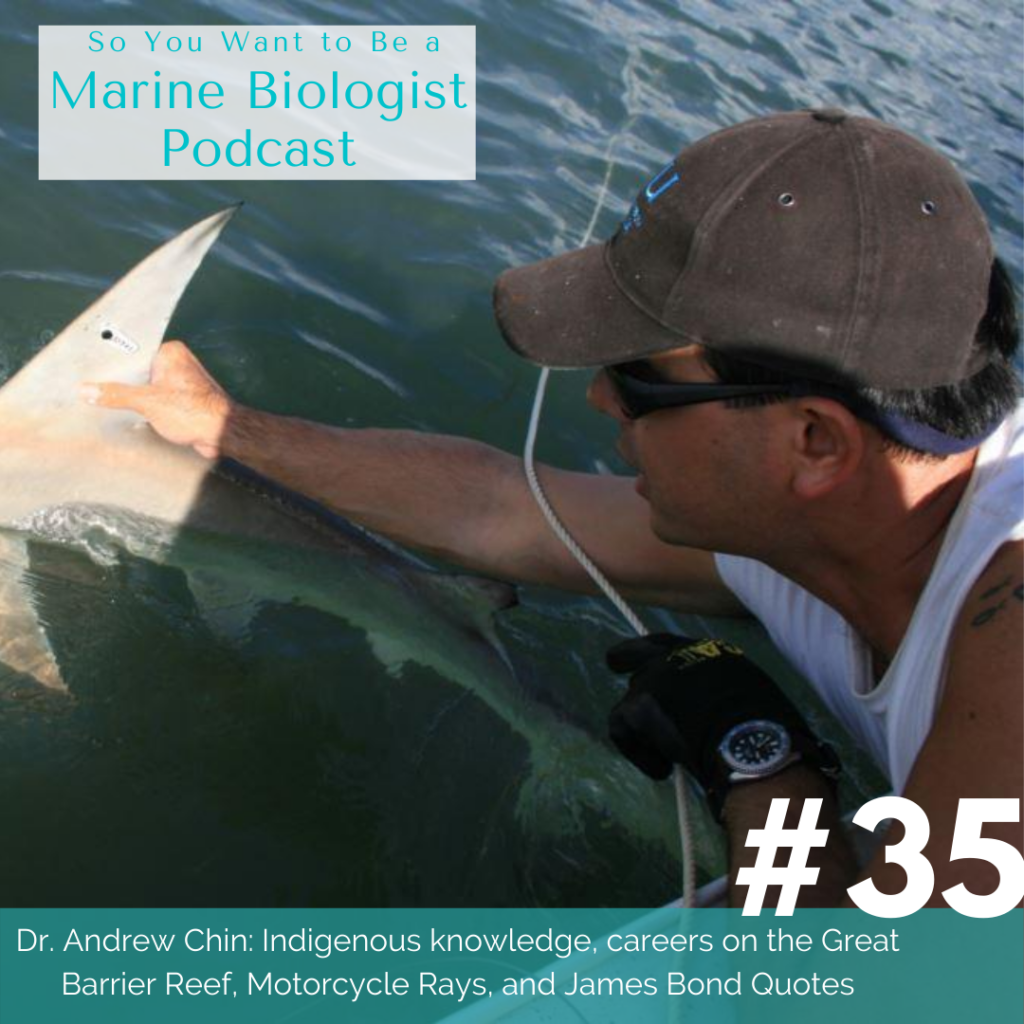“Life is unpredictable and varied, but if you have a direction, and you keep moving in that direction, eventually good things will happen for you. But you have to know what you’re going and keep taking steps to get there.” -Dr. Andrew Chin, Episode 35
Most of us have been told “no” at some point in our lives and career.
Maybe it’s a job that you’ve applied for, or a school application that was rejected.
My guest today understands that “no” can also mean “not now.”
Dr. Andrew Chin is a shark researcher at James Cook University in Queensland, Australia. He knew he wanted to become a marine biologist, so he applied to one of the best marine biology programs in the world at James Cook University.
They told him “no.”
Fast forward through an undergraduate degree at a different university, some amazing career and life experiences, and ultimately Andrew was accepted to JCU for his graduate degree.
Now he is a professor there and is living the career of his dreams.
Join us today as we discuss the motorcycle ray of the sea, the incredible citizen science programs across the Indo-Pacific, and some of the lessons Andrew has learned and teaches anyone that is figuring out their career, including the lesson of persistence.
Connect with Andrew: Instagram| website
Quick Links
Jacques Cousteau
Blacktip shark
Hammerhead Shark
Great Barrier Reef
Great Barrier Reef Marine Park Authority
Tonic immobility
Adam Barnett
Central Queensland University
Heron Island
Australia Institute of Marine Science
Coral Sea
Undersea Explorer
David Whackenfeld
Eye on the Reef
Albino Humpback Whale
Porcupine Rays
Terry Walker
Rory McCauly
Save Our Seas Foundation
Yuku Baja Muliku Project
Ian MacLeod
Professor Colin Simpfendorfer
Archerfish
Ornate Eagle Ray
Master Reef Guides
Tobin’s Fish Tales
Shark Search
Show Notes
2:40 Andrew shares just how much his family indulged his fishy passions, even though they didn’t completely understand them. The pinnacle experience? Fish for Christmas!
3:45 Why Andrew used to love hammerheads, and why, during his research he came to the conclusion he’d be happy to never work on them again. Andrew shares tagging stories, how to tag a hammerhead, and the surprising results of his research: hammerheads in the GBR hang out!
12:17 Stories from the field: one of the best/worst days tagging hammerhead sharks.
16:08 Andrew’s role within the Great Barrier Reef Park Authority, how the acronym is pronounced, and what a dog’s breakfast is!
19:02 Life after undergrad: a job in the tourism industry and then a move based solely on faith in order to network and follow the career path of his dreams. His advice? Take all opportunities very seriously, even volunteer ones. Show up.
22:26 Citizen science: having people of the public/community collecting data in a repeatable, verifiable way.
27:13 The Great Porcupine Ray Hunt: how shark research lead to discovering a species of an incredibly vulnerable species of ray. Porcupine rays are the bikers of the rays, fully armored.
33:56 Andrew’s work with the local communities: how working with traditional owners (first nations, indigenous people) is a very different method of working with citizen scientist. They’re full of traditional ecological, or indigenous, knowledge
40:12 “Science is about the process of inquiring. It’s not about being the world’s expert in one thing. If you have the experience of knowing how to collect data, how to analyze it…then you’re doing yourself a disservice if you focus on one single thing.”
42:05 “The Business of Science” workshop. Andrew’s experience over the years of interviewing people and translating it. Soft skills are hugely important. The days of working in a basement with your specimens are likely over. You need to be able to work with people, hold yourself accountable, work a budget. 3.5% of PhD graduates end up as research staff, 0.5% end up as tenured professors. “You have not failed if you do not become your supervisor.”
47:51 Why Andrew made the switch from working at the Marine Park Authority to working in academia, quitting his secure government job to living on a scholarship just above the poverty line. What it means to define success for yourself.
51:47 “Life is unpredictable and varied, but if you have a direction, and you keep moving in that direction, eventually good things will happen for you. But you have to know what you’re going and keep taking steps to get there.” Great way to define success: where and how do you want to live?
54:12 Andrew shares three dream projects: researching a spitting fish with indigenous people, learning the movements of the ornate eagle ray, working anywhere in SE Asia, or the Pacific with indigenious people to work towards a sustainable fishery.
58:49 Andrew’s favorite field stories: getting attacked by a shark and trying to get a suction-cupped ray off the ocean floor. “If we knew what we were doing, it wouldn’t be called research.”
1:06:08 Andrew’s ask for the audience: “think globally, act locally.” Climate change and seafood sustainability. Make choices to reduce your climate impact. Forget everyone else, you do your bit. If you’re having seafood, you should know what you’re eating, where it came from, and how it was caught.
1:10:08 Andrew’s favorite seafood? From past fisheries scientists that turned into sustainable fishermen.
